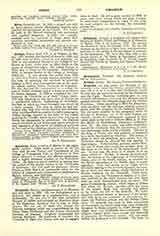

Arsacidae. —It was under the Dynasty of the Arsacids, who ruled the Persian empire from the year 256 B.C. to A.D. 224, that Christianity found its way into the countries watered by the Euphrates and the Tigris. Nestorian traditions give no very accurate information concerning the relations which existed between the Arsacide kings and the Persian Christians. These, according to Mari ibn Sulayman, were excellent, and the churches enjoyed profound peace until the accession of the Sassanid, Sapor I. Yet the same annalist, in the paragraph which he devotes to Abraham, one of the early Persian patriarchs, speaks of a persecution supposed to have taken place in the latter’s lifetime (Mari, 5, cf. Amr ibn Matai, 3; Barhebraeus, Chronicum ecclesiasticum, 21). He even knows, and other chroniclers repeat the statement, that the persecution in question was brought to an end by a miracle. The son of the King of Persia, who was epileptic or possessed by a devil, was healed by Abraham. The prince, in order to show his gratitude, gave orders that the Christians should be allowed the free exercise of their religion. Unfortunately, however, neither Mari, nor any of those who copied his account, gives us the name of the king or of the miraculously cured son. In any case, the story as it stands is of no value whatever. Today, it stands demonstrated that the history of the beginnings of Christianity in Persia, prior to the fourth century, as recorded by the Syrian chroniclers of the Middle Ages, is purely legendary. They had access to no single serious document relating to the Arsacide Dynasty, the memory of which had been almost wholly blotted out of Persian tradition by the Sassanids. There were, moreover, very few Christians in Assyria or in Chaldea, previous to the third century, and even these were not easily discriminated from the Jews. The great Christianizing mission, which began at Edessa and which the Syrians associate with the name of the apostle Mare, had certainly not spread so far before the fall of the Arsacids. We must, therefore, perforce remain in ignorance of the nature, and even as to the existence, of the relations between the Parthian princes and the Persian Christians. If, however, one cares to form conjectures on the subject, he should recall that these monarchs, foreigners in Persia properly so called through their origin, were very indifferent fire-worshippers. The religious bigotry which later moved the Sassanids to persecute the Christians, cannot, with any probability, be attributed to the Arsacids. We know, in fact, that they always showed themselves tolerant, and even favorable, towards the Jews (Graetz, Histoire des Juifs, Bloch’s French tr., 162-177), and there is every reason to believe that they acted in the same manner towards the Christians, if they ever came in contact with them at all.
J. LABOURT

